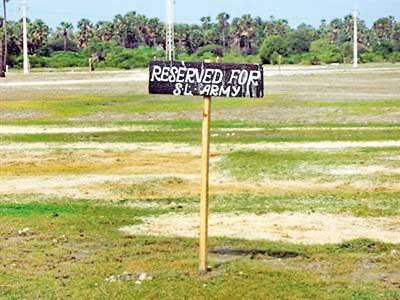_Recast-DM-8-1.jpg) ‘Force for Unity’ to join TNA’s campaign for implementation of demands
‘Force for Unity’ to join TNA’s campaign for implementation of demands
The recent Supreme Court judgment laid bare the limitations of the 13th amendment. Hon Peiris says “Having adopted the above analysis and in the light of the structure and scheme of the constitutional settlement of the 13th amendment to the Constitution, the irresistible conclusion is that the Provincial Council subject matter in relation to State Lands would only mean that the Provincial Councils would have legislative competence to make statutes only to administer, control and utilise State land, if such State land is made available to the Provincial Councils by the Government for a Provincial Council subject. As I pointed out above, if and when a National Land Commission is in place, the guidelines formulated by such a Commission would govern the power of the Provincial Councils over the subject matter as interpreted in this judgment in relation to State Lands.”
"All Tamil organisations claim, the 13th amendment is limited and unclear and want serious revisions. The landmark verdict of the Supreme Court issued on land powers under the 13th Amendment, ruled that rights over land are vested with the Central Government and not the Provincial Councils, supports the claims of the Tamil people."
However according to his argument, the power of the Provincial Council for administering, controlling and utilising a State land made available to a Provincial Council, is not sufficient for a competent authority to issue a quit notice for ejectment. Clearly the powers given by the 13th amendments must be revised as demanded by the TNA election programme. All democratic forces should be thankful to the Supreme Court, to my Ananda College class mate Gomin Dayasiri and Sumanthiran for exposing the contradictions in the 13th amendment; in particular on the issue of land powers!

Unfortunately there is no voice within the government that stands for a parliamentary discussion on the proposals of the TNA. In the past when the ISGA document came up for discussions, the present leaders of the Government violently condemned that document as a proposal for separation. The LTTE continuously emphasised that they made those proposals for internal self determination. ISGA was considered to be a stepping-stone towards a satisfactory sharing of power. All Tamil organisations claim, the 13th amendment is limited and unclear and want serious revisions. The landmark verdict of the Supreme Court issued on land powers under the 13th Amendment, ruled that rights over land are vested with the Central Government and not the Provincial Councils, supports the claims of the Tamil people. There is no substantial devolution by the 13th amendment.
"All parties in this alliance paid tribute to the Tamil people in the north for resisting the military oppression of the Government and giving a historic defeat to the oppressive forces. Discussions revealed that there will be a united campaign which includes the trade unions and other mass organisations"
The Judges ruled that under the constitution, land was vested in the people or the Central Government to be handed over to the Provincial Councils according to law and on their request. This judgment also overturns rulings by former Chief Justice Sarath N Silva and CJ Shirani Bandaranayke who ruled separately that land powers lay with the Provincial Councils. This shows the contradictory nature ingrained in the 13th amendment. On the other hand land and police powers although claimed to be devolved under the 13th Amendment, have never been granted to provincial council administrations. Ironically the ruling came a few days after northern Tamils gave the Tamil National Alliance an overwhelming mandate to seek greater autonomy and more political rights for the Tamil homeland.
"Unfortunately there is no voice within the government that stands for a parliamentary discussion on the proposals of the TNA."
In the meantime the Force for Unity, the action front that includes UNP, NSSP and many other oppositional parties decided to campaign together with the TNA for the implementation of Tamil demands. All parties in this alliance paid tribute to the Tamil people in the north for resisting the military oppression of the Government and giving a historic defeat to the oppressive forces. Discussions revealed that there will be a united campaign which includes the trade unions and other mass organisations. Election frenzy has eclipsed the serious economic issues raised by the trade unions and mass organisations. There is a consensus among trade unions that they would support the democratic demands of the Tamil alliance, if the common campaign stresses on economic issues that affect all communities. This growing solidarity has attracted many political tendencies irrespective of their electoral alliances. Though trade unions are in different fronts and alliances they are united in common demands. A united struggle in the same format as in the struggle against the electricity price-hike, could emerge in the near future
_Recast-DM-8-1.jpg) ‘Force for Unity’ to join TNA’s campaign for implementation of demands
‘Force for Unity’ to join TNA’s campaign for implementation of demands